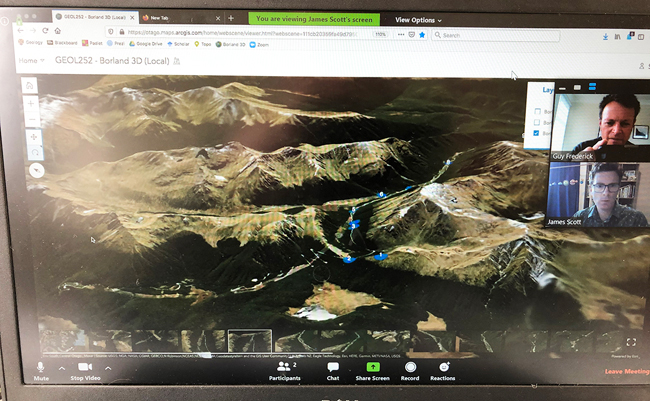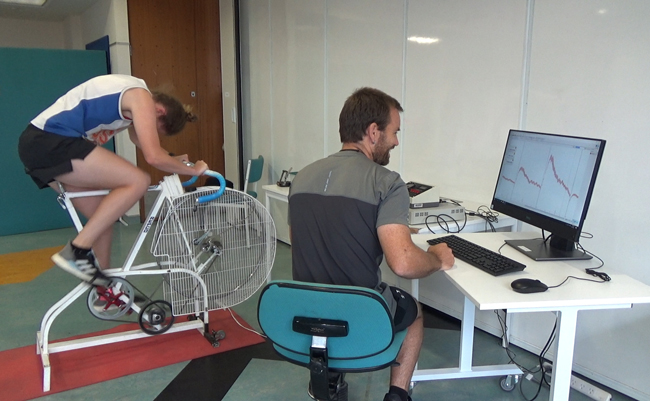Tuesday 28 April 2020 8:46pm
The COVID-19 lockdown has created unique challenges for science online learning and the translation of lab work and field trips traditionally considered essential for experiential learning. The Otago Bulletin Board “visited” the Department of Geology and the School of Physical Education, Sport and Exercise Sciences to see how they have responded.

Associate Professor James Scott shows Communications Adviser Guy Frederick the virtual landscape he created following a whirlwind trip to Fiordland to photograph and video important geological spots for a lockdown COVID-19 field trip.
When the Department of Geology’s flagship annual 200-level Fiordland field trip was put in jeopardy due to the impending lockdown, the paper’s convenors decided it still needed to go ahead.
After all, the field trip was a staple in Geology’s annual calendar with a long history dating back to the 1970s after the road servicing the Manapouri power station’s pylons was constructed revealing outcrops and geological features perfect for learning in the field.
The experience of a four-day field trip to Fiordland was no easy task to replicate online, however Associate Professor James Scott and Professor James White alongside the expertise of technician Stephen Read, decided to embrace the challenge.
Associate Professor Scott made a weekend dash to Fiordland before lockdown with a camera to acquire location videos and outcrop images for more than 50 sites which Head of Department Professor White says was “a critical addition” to the Department’s online offering.
Over the next few days, the team developed an interactive on-line platform, transferring collated video and photography content from all geological sites into ArcGIS (Geographic Information Systems) software.
"While nothing fully replaces the experience of working in the field and getting your hands onto the rocks with your peers, we found that the online interactions with, and among, students worked very well."
During the four-day field trip the group of 38, comprising students from across New Zealand and the USA, were guided by the lecturers using Zoom and ‘visited’ two dozen key geological sites. They also had access to visual and geological information for another thirty locations.
“What we tried to do was preserve some key aspects of geology by using the software to conduct field observations to understand the local topography, and combine this with a more hands-on traditional task where each student developed a geological map from their observations,” Associate Professor Scott says.
At each location, students were guided to work through a set of tasks and they also broke out (on Zoom) to work in small groups with the opportunity to interact more personally and connect, which are also key aspects of a multi-day field experience.
“While nothing fully replaces the experience of working in the field and getting your hands onto the rocks with your peers, we found that the online interactions with, and among, students worked very well,” Professor White says.
“Some aspects of the online experience worked so well that we now plan to build them into future field teaching as important supplements to the real thing.”
Across the Department, virtual versions of other field trips were also quickly produced and transferred to digital platforms, including a 100-level field trip focused on the Taieri and scheduled to run on the first weekend of the lockdown.
Dr Christian Ohneiser and Dr Sophie Briggs spent a day on the Taieri Plains capturing footage introducing the geology and hydrological systems of the area, which was then edited into a 25-minute animated video with the help of Stephen Read over four days.
Dr Ohneiser says an added benefit of the resulting video is its availability for schools, families and the wider Dunedin community who would like to learn some interesting facts about the Taieri and some local geological history. The video can be viewed here.
Professor Mark Stirling’s virtual field trip on natural hazards with a focus on the local Akatore Fault and Abbotsford Landslide can also be viewed here:
Head of Department Professor James White says the work undertaken in the Department of Geology to turn field teaching into online teaching has been illuminating.
“The virtual versions will be superb supplements to the 'real thing' when it's available again, and it’s great to know the hard work of making this shift, in a hurry, will also provide a long-term payback in terms of multi-modal learning," Professor White says.

Physical Education staff collect data ahead of the lockdown in order to run labs online.
Across campus it was also all hands-on deck at the School of Physical Education, Sport and Exercise Sciences who were tasked with creating content from nine lab sessions for online learning.
Teaching Fellow Dr Neil Anderson said it was a huge logistical task to gather the material and data in the two days before lockdown, as the additional complication for physiological testing is the requirement for the subject to fully recover between tests.
"A lot of hands were required to do the testing and collect the data, and seeing the students get involved and just get on with what needed to be done was fantastic. The teamwork was really heart-warming."
Dr Anderson was joined by ten others including students to complete a wide range of activities across the biomechanics lab, environmental chamber and the flume facility.
“It was a huge logistical task as multiple things were happening simultaneously across the labs to keep everything flowing and to be able to collect what we needed within the time deadline,” Dr Anderson says.
“A lot of hands were required to do the testing and collect the data, and seeing the students get involved and just get on with what needed to be done was fantastic. The teamwork was really heart-warming.”
Sciences Pro-Vice-Chancellor Professor Richard Barker says the amount of additional work undertaken in a small amount of time to transfer to an online teaching environment highlights the impressive dedication that staff have to their students.
“We can all be proud of the effort across the Division including the creativity that has been shown to find ways to address the unique challenges of lab and data-based sciences that form the basis for Otago’s research and teaching excellence,” Professor Barker says.
